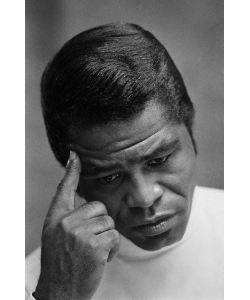
>> © Christian Simonpietri/Sygma/Corbis
James Brown died this past Christmas morning. He was the consummate entertainer, a penultimate personification of drive, stamina, and the so-called "American Dream," with all of the riches and conflicts that questionable ideals carry, especially with regard to African Americans.
I’ll never forget the night I first saw him in concert. It was November 14, 1997, and thanks to a snowstorm, the crowd at the now-defunct Lulu’s Roadhouse in Kitchener, Ontario, was less than half full. I’d managed to make my way up to the front of the stage, and as the exhortations of emcee Danny Ray and the opening snare shots of “ Cold Sweat” rang out into the crowd, there he was: badder than bad, cleaner than clean, “ Mr. Dynamite” himself: JAMES BROWN!!
Most official reports state that James Brown was born in a shack in Barnwell, South Carolina, on May 3rd, 1933. That’s open to debate, but what is unquestionable is, as Cliff White & Harry Weinger point out in the liner notes of the CD “Star Time”:
“James Brown was born to lose. He refused to accept that fate.”
Raised in a brothel in Augusta, Georgia, James Brown was imprisoned for petty theft in 1949 for breaking into a car to steal a coat at 15 years of age. Released three years later, he became determined to become an entertainer. He joined his friend Bobby Byrd's group and, helped by his struts, splits and obsession to outdo Little Richard, the outfit now christened The Flames released the million-seller, " Please, Please, Please" in 1955. Disgruntled with Brown's top-billing, The Flames dissolved. Solo classics like "Try Me,” "Bewildered" " and "Night Train" burned up the charts. Most smouldering however, was Brown''s reputation as an outstanding live performer or as he couldn''t have put it better himself; "Mr. Dynamite".
"So now, ladies and gentlemen, it's Star Time. Are You Ready for Star Time?!!" so began Fats Gonder's introduction on "James Brown Live at the Apollo," recorded on October 24, 1962, at the famed theatre. "Live At The Apollo" is perhaps one of the seminal live albums of all time, if not the greatest. It is the album that finally broke Brown through as a mainstream performer. Just over 30 minutes long, "Apollo" is a transcendental recording, distilling James Brown's omnipotence; a sort of Saturday night church, if you might, alternately exhilarate and exhausting. At a time when the R&B market was thought to be only singles dominated, Brown established the album format, peaking at #2 in the summer of 1963. Record label execs doubted the album's potential, but it was followed by four sequels. "The Hardest Working Man in Show Business" had been vindicated.
"Live At The Apollo" was enough to establish Brown's legacy for a lifetime. But this was only the beginning. Recorded the month Malcolm X was assassinated, "Papa's Got a Brand New Bag" and follow-ups like the legendary "I Got You ( I Feel Good)” with their intense and tight grooves seemed to foretell the tumultuous years of the late 1960s. But it was the absolute Bomb that was "Cold Sweat," released in the summer of 1967, that is often credited as the first Funk groove. Driven by Clyde's" Give The Drummer Some," Stubblefield's on the one groove, and Maceo Parker''s inspired sax solo, "Sweat," not only ignited a rhythm revolution in America but the vibrations were being felt throughout the diaspora from Kingston to Rio to Lagos. Along with Muhammad Ali, James Brown was becoming a global icon of black pride and determination.
This was a role that Mr. Brown took very seriously: buying the radio stations WJBE in Knoxville, TN, and WRDW in Augusta, GA. Entertaining U.S. troops in Vietnam, investing in a chain of Soul food restaurants. Brown was the embodiment of his philosophy of "Get an education! Work hard! Get in a position to own things. That's Black power!" A staunch Republican, he campaigned with Hubert Humphrey in 1966 and sided with Nixon in the early 1970's. This controversial political affiliation would haunt him into his twilight, resulting in hisses and boos at Toronto''s Molson Amphitheatre in 2004 when he attempted to have a moment of silence for the recently departed Ronald Reagan. In December of 1988, James Brown was handed two concurrent six-year prison sentences stemming from traffic violations and resisting arrest. Released in 1991, Brown continued to tour endlessly. Admittedly, at the sunset of his career, Brown's shows still continued to galvanize current fans of hip-hop and R&B who wanted to know what the hype was in the first place.
So, back to that night in Kitchener in 1997: It was one of the greatest concerts I'd ever seen in my life. Well into his 60s, Brown had a vision of energy and vitality. It is a picture I'll always remember. And throughout all of the ups and downs of his remarkable career, it's that uncompromising, forceful, relentless vision that exists. The most influential musician of the last half of the 20th century, an influence on politics, fashion and arguably the greatest showman of our time, James Brown, will always be Soul Brother #1.
Rest in Peace, Godfather!




